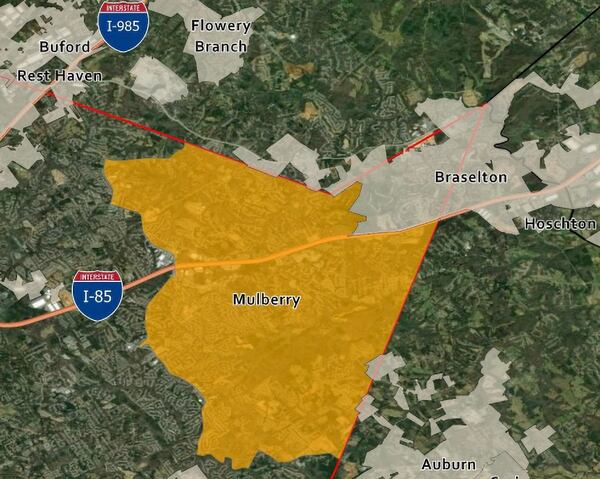The Georgia Court of Appeals recently revived Gwinnett County’s lawsuit against the state of Georgia over the new city of Mulberry, creating the possibility of a decision on whether Gwinnett’s second most populous city can legally exist.
“We’ll keep fighting these lawsuits,” Mulberry Mayor Michael Coker said. “We’ll keep doing what we need to do, but I hope we can get to a time when we can put all these lawsuits behind us.”
Georgia Attorney General Chris Carr plans to pursue an appeal, a spokesperson said. If appeals are unsuccessful, the case will return to Fulton County Superior Court.
Officials with Gwinnett County did not respond to requests for comment.
The county sued the state last year, arguing the local law that contains the Mulberry charter is unconstitutional because it prohibits the city from imposing a property tax — a right cities have under the state constitution. The county also argued the charter is unconstitutional because it spells out which services the city will provide and prohibits Gwinnett County from zoning in the city limits during the transition period that ends next year.
Gwinnett’s lawsuit was the first filed by a metro Atlanta county over the creation of a new city since a suburban incorporation wave began two decades ago. Residents and a developer have also sued unsuccessfully to block Mulberry.
The city was incorporated on New Year’s Day.
Credit: Hand out
Credit: Hand out
A Fulton County judge dismissed Gwinnett’s lawsuit later in January, saying the county did not have standing to ask for a declaratory judgment because there was no uncertainty over specific actions the county needed to take. But the appeals court on Oct. 31 rejected that argument.
“The county has shown a justiciable controversy about whether it must perform various functions as directed by an allegedly unconstitutional senate bill,” said the decision, written by three judges. “So we reverse.”
In addition to the zoning prohibition, the local law requires the county to spend time and money participating in the transition of services to Mulberry and negotiating intergovernmental agreements, the judges said.
“The county is thus in a position of uncertainty as to whether it should follow those invalid mandates and continue to facilitate the creation and maturation of an allegedly invalid city,” the decision said.
Coker said he was supposed to meet with county leaders Nov. 3 to start discussing city services, but the county canceled the meeting after the appeals court ruling. Mulberry has already taken over zoning in the city limits, Coker said.
Credit: Ben Hendren
Credit: Ben Hendren
Mulberry covers about 26 square miles and 41,000 residents in northeastern Gwinnett. Local Republicans proposed the city two years ago as a response to applications for large-scale residential development in the area.
On the same day as the appeals court ruling, the same Fulton judge whose decision it overturned used similar reasoning to dismiss a second lawsuit over Mulberry that Gwinnett filed against the state in May.
In that lawsuit, Gwinnett challenged new local laws requiring the county to pay some of Mulberry’s expenses. One of the laws waives legal immunity for Gwinnett County and its officials “in all matters” for a year if a court finds the county in violation. Gwinnett asked for a declaratory judgment that the laws are unconstitutional and requested an injunction against them.
In her dismissal order, Fulton County Superior Court Judge Rachelle Carnesale said there were no allegations the state was enforcing the law and she could not rule on a hypothetical dispute.
“There is no request for the State to act or abstain from acting in any manner,” the order said.
Staff writer Rosie Manins contributed to this article.
About the Author
Keep Reading
The Latest
Featured



